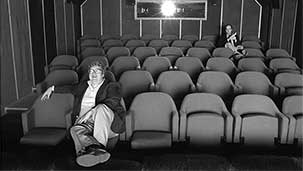Dear Jared Young and Tim McEown,
Let’s talk about the nature of criticism and the role of a critic.
There are micro conditions (popcorn quality, sleep deprivation, theatre setting) and macro conditions (time of year, proximity to similar releases) that affect our reaction to a film. We’re human, and reviews shouldn’t be written like a multiple choice exam. But there is a necessary balance between cold-hearted calculations and masturbatory extra-textual analysis.
Our job as critics is not to dive inward and explain why a certain moment at our junior high dance made us feel a certain way about a certain scene. The more you try to decode your subjectivity, the more you abdicate your role as a critic. You become an investigative reporter on your own emotions, and the result (while often pleasant to read) is ultimately only relevant to a single viewing experience. If you’re always interrogating your personal history and circumstances in relation to a film, then you’re still just reacting to films. You’re not being a critic.
No one is asking you to divorce yourself from your subjectivity (that which makes your perspective unique), but you do have a responsibility to control it. In fact, you have to if you want to build trust with your audience.
There’s a reason professional critics are creatures of routine. They usually sit in the same theatre seats, arrive at approximately the same time before a screening, and get used to the hallow of empty press screenings or the over-enthused energy of advance public screenings. Like a professional athlete, you need to learn how to tune out as many distractions as possible. And the more you’re able to do that without losing your talent and energy, the more you become a star. Everything else is bush league.
We’ve all seen YouTube videos of dazzling plays by junior athletes, or marveled at impossible trick shots. The same can be said about amateur critics who give blistering sarcastic reviews or blow up with emotion praising a new franchise film that gave them a reason to live again. But professionals provide us something else. The roll of the critic is to stick handle personal emotions with finesse and beauty, without ever forgetting that there is a goal in mind. The audience wants to walk away knowing the score – otherwise it feels like watching a skills competition or backyard practice.
In that spirit, major film festivals and the awards season are akin to the playoffs. The stakes are high and pressure is ever-present. Everyone is prone to over-praising certain moments or pilling on the under-performers. So should a critic’s job be to judge every film by these extra-textual conditions? Are those the critics you trust when trying to decide where to spend your time and money as an audience member? If a bad burrito gave a blogger indigestion before a screening, is it your responsibility as a reader to separate out that stink from his review?
The best critics of our time understand how to make an experience relatable to an audience. They look at art and engage a special set of skills to blend formal analysis with personal context. And the ones we dismiss outright are usually the ones we know can’t trust their own reactions because they are too easily influenced by circumstance. Their contribution to the larger cultural discussion becomes muted, and even less beneficial over time.
All this to say, I still can’t decide if I want to watch the De Palma documentary.
Sincerely,

Christopher






